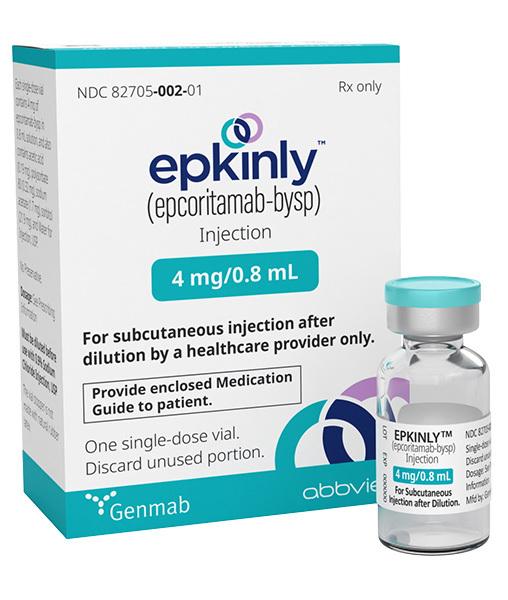Keytruda (pembrolizumab) vs Epkinly (epcoritamab-bysp)
Keytruda (pembrolizumab) vs Epkinly (epcoritamab-bysp)
Keytruda (pembrolizumab) is an immune checkpoint inhibitor that targets the PD-1 pathway and is widely used for various types of cancer, including melanoma, non-small cell lung cancer, and head and neck cancers, among others. It works by enhancing the body's immune response against cancer cells. On the other hand, Epkinly (epcoritamab-bysp) is a bispecific antibody designed for the treatment of B-cell non-Hodgkin lymphoma, targeting both CD20 on B-cells and CD3 on T-cells to recruit the body's immune cells to attack cancer cells. The choice between these two medications would depend on the type of cancer a patient has, as well as their overall health, previous treatments, and specific medical needs. It is crucial for patients to consult with their healthcare provider to determine the most appropriate treatment option based on their individual condition and the specific indications of each drug.
Difference between Keytruda and Epkinly
| Metric | Keytruda (pembrolizumab) | Epkinly (epcoritamab-bysp) |
|---|---|---|
| Generic name | pembrolizumab | epcoritamab-bysp |
| Indications | Various types of cancers including melanoma, lung cancer, head and neck cancer, Hodgkin lymphoma, and others | Currently under investigation for B-cell non-Hodgkin lymphoma |
| Mechanism of action | Programmed death receptor-1 (PD-1) blocking antibody | Bispecific antibody targeting CD3 on T-cells and CD20 on B-cells |
| Brand names | Keytruda | Epkinly |
| Administrative route | Injection (IV) | Subcutaneous injection |
| Side effects | Fatigue, musculoskeletal pain, decreased appetite, pruritus, diarrhea, nausea, rash, pyrexia, cough, dyspnea, constipation, pain in extremity, and headache | Currently being evaluated in clinical trials; specific side effects are not yet fully characterized |
| Contraindications | None known; caution in patients with autoimmune disease or those receiving immunosuppressive therapy | Not yet fully established; likely contraindicated in patients with hypersensitivity to epcoritamab-bysp or its excipients |
| Drug class | Anti-PD-1 monoclonal antibody | Bispecific antibody |
| Manufacturer | Merck & Co. | Genmab and AbbVie |
Efficacy
Keytruda (Pembrolizumab) Efficacy in Lymphoma
Keytruda, known generically as pembrolizumab, is a type of immunotherapy drug that has shown promise in treating various forms of cancer, including lymphoma. It is a monoclonal antibody that works by blocking the PD-1 pathway, which some tumors use to protect themselves from the immune system. By inhibiting this pathway, Keytruda can help the immune system to recognize and fight cancer cells. In the context of lymphoma, Keytruda has demonstrated efficacy particularly in Hodgkin lymphoma after the failure of other treatments. Clinical trials have shown that Keytruda can induce a significant response rate in patients with relapsed or refractory classical Hodgkin lymphoma, leading to its approval for this indication.
Epkinly (Epcoritamab-bysp) Efficacy in Lymphoma
Epkinly, also known as epcoritamab-bysp, is an investigational bispecific antibody designed to bind to both CD3 on T-cells and CD20 on B-cells, which are commonly expressed in non-Hodgkin lymphoma (NHL). This dual binding is intended to bring T-cells into close proximity with the cancerous B-cells, thereby promoting the immune system's attack on the tumor cells. While still under clinical investigation, preliminary data from early-phase trials suggest that Epkinly can induce responses in patients with relapsed or refractory B-cell non-Hodgkin lymphoma. These studies are ongoing, and the efficacy and safety of Epkinly continue to be evaluated in a larger patient population.
Comparison of Efficacy in Lymphoma Treatment
Comparing the efficacy of Keytruda and Epkinly directly is challenging due to differences in their mechanisms of action, the specific types of lymphoma they target, and the stages of clinical development. Keytruda has an established track record in treating Hodgkin lymphoma, particularly after other treatments have failed. In contrast, Epkinly is a newer therapeutic option that is still undergoing clinical trials, primarily focusing on non-Hodgkin lymphoma. Both treatments represent significant advancements in lymphoma therapy, offering hope to patients who have limited options due to the refractory nature of their disease.
Continued Research and Development
The continued research and development of drugs like Keytruda and Epkinly are critical for improving outcomes for lymphoma patients. As clinical trials progress, more data will become available to assess the full potential of these drugs. It is important for healthcare providers to stay informed about the latest research findings to optimize treatment strategies for lymphoma. Additionally, the use of these drugs may expand to other types of lymphoma as more evidence accumulates regarding their efficacy and safety profiles. Patients with lymphoma should discuss with their oncologists the potential benefits and risks of these emerging therapies as part of their treatment plan.
Regulatory Agency Approvals
Keytruda
-
European Medical Agency (EMA), European Union

-
Food and Drug Administration (FDA), USA

-
Health Canada

-
Therapeutic Goods Administration (TGA), Australia

-
Medsafe (NZ)

Epkinly
-
Food and Drug Administration (FDA), USA

Access Keytruda or Epkinly today
If Keytruda or Epkinly are not approved or available in your country (e.g. due to supply issues), you can access them via Everyone.org.
How it works

Make an enquiry
Choose the medicine you want to buy, answer a couple of questions, and upload your prescription to speed things up. We’ll get back to you within 24 hours.


Make an enquiry
Choose the medicine you want to buy, answer a couple of questions, and upload your prescription to speed things up. We’ll get back to you within 24 hours.


Breeze through the paperwork
We'll guide you through the required documents for importing unapproved medicine, ensuring you have all the necessary information.


Get a personalized quote
We’ll prepare a quote for you, including medicine costs and any shipping, administrative, or import fees that may apply.


Receive your medicine
Accept the quote and we’ll handle the rest - sourcing and safely delivering your medicine.

Some text on this page has been automatically generated. Speak to your physician before you start a new treatment or medication.
Let's talk
If you have any questions, call us or send us a message through WhatsApp or email:
Contact us




